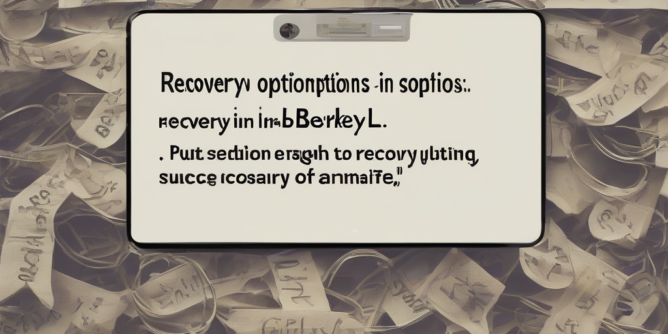
Navigating the Labyrinth: A Comprehensive Guide to Options Recovery in Berkeley
Berkeley, a city renowned for its vibrant academic community and progressive ethos, also faces the challenges of substance abuse and addiction. Options recovery in Berkeley, therefore, represents a crucial aspect of community well-being. This guide aims to provide a thorough understanding of the resources, approaches, and support systems available for individuals seeking recovery from substance use disorders in Berkeley.
Understanding the Landscape of Options Recovery
The landscape of options recovery in Berkeley is multifaceted, encompassing a range of services and approaches tailored to individual needs. These options extend from residential treatment centers to outpatient programs, support groups, and holistic therapies. Understanding the nuances of these options is critical for navigating the recovery journey successfully.
Types of Treatment Programs
- Inpatient Treatment: This involves residing at a residential facility for an extended period, offering intensive therapy and medical supervision. Inpatient programs are ideal for individuals requiring a structured environment to detoxify and address underlying issues.
- Outpatient Treatment: This option allows individuals to continue living at home while attending therapy sessions and support groups on a regular basis. It is suitable for those with stable living situations and a strong support system.
- Partial Hospitalization Programs (PHP): These programs offer a structured daytime setting with intensive therapy and medical monitoring, allowing individuals to return home in the evenings. PHPs bridge the gap between inpatient and outpatient care.
- Intensive Outpatient Programs (IOP): IOPs provide a more intensive level of outpatient care than traditional outpatient therapy, with more frequent sessions and a higher level of structure.
Therapeutic Approaches
- Cognitive Behavioral Therapy (CBT): CBT helps individuals identify and change negative thought patterns and behaviors contributing to substance abuse.
- Dialectical Behavior Therapy (DBT): DBT is particularly effective for individuals with co-occurring mental health conditions, such as borderline personality disorder, and teaches skills for emotional regulation and distress tolerance.
- Motivational Interviewing (MI): MI helps individuals explore their ambivalence towards change and develop intrinsic motivation for recovery.
- 12-Step Programs: These programs, such as Alcoholics Anonymous (AA) and Narcotics Anonymous (NA), offer peer support and a structured approach to recovery based on the 12 steps.
- Holistic Therapies: These may include yoga, meditation, acupuncture, and other practices aimed at promoting physical and mental well-being as part of the recovery process.
Finding Resources in Berkeley
Berkeley offers a diverse array of resources to support individuals seeking options recovery. Navigating these resources requires careful consideration of individual needs and preferences.
Treatment Centers and Clinics
Several treatment centers and clinics in and around Berkeley offer various levels of care. It’s crucial to research these facilities, considering factors such as accreditation, treatment modalities, and staff qualifications. Many centers specialize in particular substances or co-occurring disorders.
Support Groups and Community Organizations
Numerous support groups and community organizations in Berkeley provide a vital network of support for individuals in recovery. These groups offer a safe and non-judgmental space to share experiences, build connections, and receive encouragement. Some examples include AA, NA, and SMART Recovery meetings.
Medical and Healthcare Professionals
Accessing medical and healthcare professionals is essential for managing withdrawal symptoms, addressing co-occurring mental health conditions, and providing ongoing medical support during recovery. Primary care physicians, psychiatrists, and addiction specialists can play crucial roles in the recovery journey.
Financial Assistance and Insurance Coverage
The cost of treatment can be a significant barrier for many individuals. Exploring options for financial assistance, including insurance coverage, grants, and scholarships, is crucial in ensuring access to quality care. Many treatment centers offer assistance in navigating insurance complexities.
Navigating the Challenges of Options Recovery
The path to recovery is rarely linear, and individuals may encounter various challenges along the way. Understanding and addressing these challenges proactively is crucial for maintaining long-term sobriety.
Relapse Prevention Strategies
Relapse is a common occurrence in recovery. Developing effective relapse prevention strategies is paramount. These strategies might include identifying triggers, building strong support systems, and developing coping mechanisms for managing cravings and stress.
Addressing Co-occurring Disorders
Many individuals struggling with substance abuse also experience co-occurring mental health conditions. Addressing these co-occurring disorders is essential for successful recovery. Integrated treatment approaches that address both substance use and mental health issues simultaneously are highly effective.
Building a Strong Support System
A strong support system is crucial for maintaining long-term recovery. This support system can include family members, friends, therapists, support group members, and sponsors. Cultivating these relationships provides essential encouragement and accountability.
Maintaining Long-Term Sobriety
Long-term sobriety requires ongoing commitment and effort. This involves continuing to attend therapy, participate in support groups, and practice relapse prevention strategies. Developing healthy coping mechanisms and maintaining a balanced lifestyle are also crucial.
Beyond Treatment: Long-Term Support and Community Involvement
Recovery is a lifelong journey that extends beyond the initial treatment phase. Continued support and community involvement are essential for maintaining long-term sobriety and preventing relapse.
Continuing Care and Aftercare Programs
Many treatment centers offer continuing care and aftercare programs to provide ongoing support and guidance after completion of the primary treatment phase. These programs may include individual therapy, group therapy, and support group participation.
Community Resources and Support Networks
Staying connected with the community is crucial for maintaining long-term recovery. This involves engaging in activities that promote well-being, fostering positive social connections, and participating in community events.
Advocacy and Awareness
Raising awareness about substance abuse and promoting access to quality treatment are vital steps in supporting individuals seeking recovery. Participating in advocacy efforts and supporting organizations that promote recovery can make a significant impact.
Celebrating Successes and Acknowledging Setbacks
Recovery is a journey marked by both successes and setbacks. Celebrating milestones and acknowledging setbacks with compassion and self-compassion are essential for maintaining motivation and perseverance.